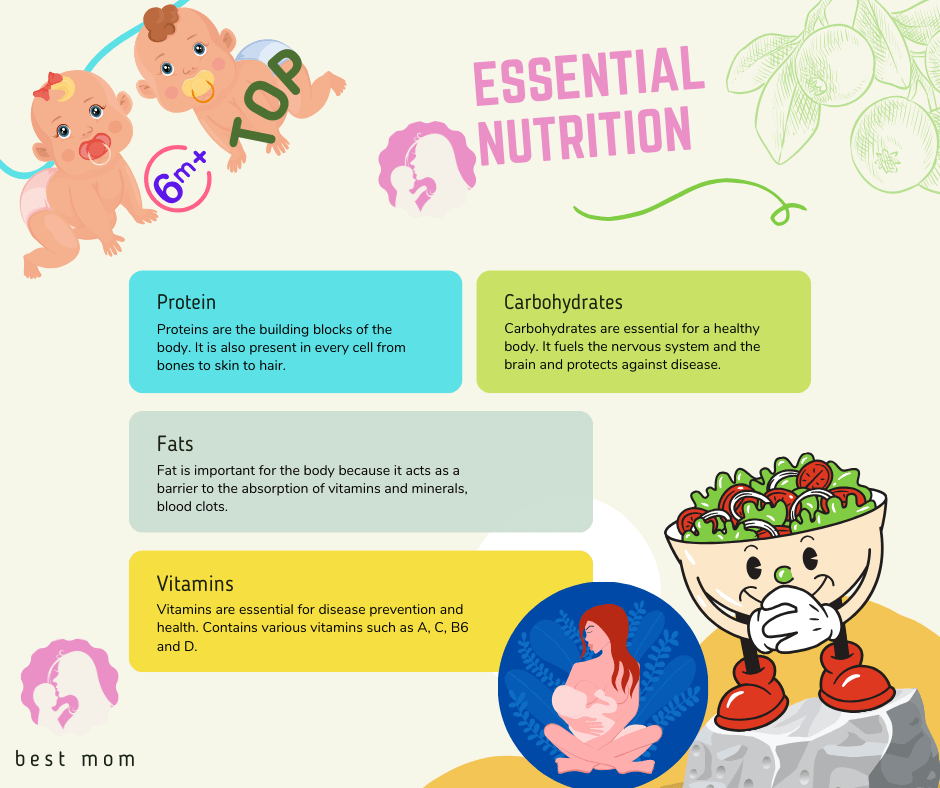Vitamin Tips، When it comes to providing essential vitamins and nutrients for your baby, offering a variety of nutritious foods is key. Here are some super meals that can help ensure your baby gets the necessary vitamins:
1. Sweet Potato Mash: ![]()
Sweet potatoes are rich in beta-carotene, which is converted to vitamin A in the body. Steam or bake sweet potatoes until soft, then mash them to a suitable consistency for your baby. You can also add a little breast milk or formula to make it smoother.
2. Avocado Puree:![]()
Avocados are packed with healthy fats, fiber, and vitamins like vitamin C, vitamin E, and vitamin K. Simply scoop out the avocado flesh and blend it until smooth. Avocado puree can be served as a standalone meal or mixed with other pureed fruits or vegetables.
3. Spinach and Lentil Puree: ![]()
Spinach is a great source of iron and folate, while lentils provide protein and fiber. Steam or boil fresh spinach leaves until wilted, then blend them with cooked lentils until smooth. You can adjust the consistency by adding breast milk, formula, or water.
4. Salmon and Quinoa Mash:![]()
Salmon is a nutritious fish that provides omega-3 fatty acids, which are beneficial for brain development. Cook a small piece of salmon and mash it with cooked quinoa. Ensure the salmon is deboned and well cooked before offering it to your baby.
5. Blueberry Oatmeal: ![]()
Blueberries are rich in antioxidants and vitamin C. Cook rolled oats with water or breast milk, then add mashed blueberries for a burst of flavor and nutrition. As your baby grows, you can introduce finely ground or mashed oats for added texture.
6. Carrot and Apple Puree: ![]()
Carrots are a good source of beta-carotene and vitamin K, while apples provide fiber and vitamin C. Steam or boil carrots until soft, then blend them with cooked apples until smooth. Adjust the consistency with water or breast milk.
Remember to introduce new foods one at a time, allowing a few days between each new food to watch for any signs of allergies or sensitivities. It’s always a good idea to consult with your pediatrician or a registered dietitian for personalized advice on introducing solids and ensuring your baby’s nutritional needs are met.
What nutrients and vitamins do babies need?

Babies require a variety of nutrients and vitamins to support their growth and development. Here are some essential nutrients and vitamins that are important for babies:
1. Protein: 
Protein is crucial for the growth and repair of tissues in the body. It helps build muscles, organs, and enzymes. Breast milk or formula provides an adequate amount of protein for infants. As babies start consuming solid foods, protein-rich sources such as meats, poultry, fish, eggs, dairy products, legumes, and tofu can be introduced.
2. Carbohydrates: 
Carbohydrates are the main source of energy for babies. They provide fuel for physical activity and brain function. Breast milk, formula, and later, solid foods like grains (rice, oatmeal, quinoa), fruits, and vegetables, supply carbohydrates.
3. Fat: 
Fat is essential for a baby’s brain development and the absorption of fat-soluble vitamins. Breast milk, formula, and healthy fat sources like avocados, nut and seed butters, and oils (such as olive oil) provide the necessary fats for infants.
4. Iron: 
Iron is crucial for the production of hemoglobin, which carries oxygen in the blood. Iron-rich foods like iron-fortified cereals, meat, poultry, fish, beans, and leafy green vegetables should be introduced to babies around 6 months of age, as their iron stores from birth start to deplete.
5. Calcium and Vitamin D: ![]()
Calcium is important for bone and teeth development, while vitamin D helps with calcium absorption. Breast milk or formula generally provides adequate calcium and vitamin D for infants. When solid foods are introduced, dairy products (milk, yogurt, cheese) and fortified plant-based milk alternatives can be included.
6. Vitamin C:
Vitamin C is important for the immune system and the absorption of iron. Fruits and vegetables like oranges, strawberries, kiwi, tomatoes, and bell peppers are good sources of vitamin C.
7. Vitamin A:
Vitamin A supports vision, immune function, and cell growth. Breast milk, formula, and foods like sweet potatoes, carrots, spinach, and mangoes are rich in vitamin A.
8. B vitamins:
B vitamins play various roles in the body, including energy production and nervous system function. Breast milk, formula, and foods like whole grains, meats, poultry, fish, eggs, legumes, and leafy green vegetables provide B vitamins.
Breast milk or formula typically meet most of a baby’s nutritional needs for the first six months. As solid foods are introduced, it’s important to offer a variety of nutrient-dense foods to ensure a well-rounded diet. It’s also recommended to consult with a pediatrician or a registered dietitian for personalized advice on meeting your baby’s specific nutritional needs.
vitamins for baby 0-6 months

For infants aged 0-6 months, the primary source of nutrition is breast milk or formula, which generally provides all the necessary vitamins and nutrients they need. In most cases, additional vitamin supplements are not required during this period. However, there are a few exceptions and specific recommendations regarding vitamins for babies in this age group:
1. Vitamin D:
The American Academy of Pediatrics (AAP) recommends giving a daily vitamin D supplement of 400 international units (IU) to all breastfed infants starting in the first few days of life. This is because breast milk may not provide enough vitamin D, and infants typically have limited sun exposure. If your baby is formula-fed and consuming at least 32 ounces (about 960 ml) per day, additional vitamin D supplementation is generally not necessary.
It’s important to follow the dosage instructions provided by your healthcare professional when administering any vitamin supplements to your baby. If you have any concerns or questions about vitamin supplementation for your baby, it’s best to consult with a pediatrician or a healthcare provider who can provide personalized recommendations based on your baby’s specific needs.
best vitamins for babies 6-12 months with iron

When babies reach 6-12 months of age, their nutritional needs expand beyond breast milk or formula, and solid foods are gradually introduced. At this stage, iron becomes an important nutrient as babies’ iron stores from birth start to deplete. Here are some vitamin supplements suitable for babies 6-12 months that include iron:
1. Iron-Fortified Cereal:
Iron-fortified infant cereals, such as rice cereal, oatmeal, or barley cereal, are often recommended as one of the first solid foods for babies. These cereals provide a good source of iron. You can mix them with breast milk, formula, or water to create a smooth consistency.
2. Multivitamin Drops:
A pediatrician may recommend a multivitamin supplement specifically designed for infants that contains iron. These drops are usually given once a day and include other essential vitamins and minerals in addition to iron.
It’s important to note that the specific iron and vitamin supplement recommendations for your baby may vary based on their individual needs and any existing health conditions. Consulting with a pediatrician or healthcare provider is essential to determine the most suitable vitamin supplement and dosage for your baby.
Additionally, introducing iron-rich foods into your baby’s diet is crucial. Some examples of iron-rich foods suitable for babies 6-12 months include pureed meats (such as poultry or beef), pureed legumes (like lentils or chickpeas), fortified infant cereals, and mashed or pureed dark leafy greens (such as spinach or kale). Combining these iron-rich foods with a source of vitamin C (such as pureed citrus fruits or vegetables) can enhance iron absorption.
Remember, it’s always recommended to consult with a healthcare professional for personalized advice on vitamin supplementation and introducing solid foods to ensure your baby’s nutritional needs are met.
Vitamin Tips: Super Meals for Your Baby

Here are some important tips about vitamins for children:
1. Breast milk or formula:
For the first six months, babies should receive breast milk or formula as their primary source of nutrition. These provide all the vitamins and nutrients needed for their growth and development.
2. Vitamin D:
It is recommended that all breastfed babies receive a daily vitamin D supplement of 400 IU (international units) to support healthy bone development. Formula-fed babies usually get enough vitamin D from formula, but it’s always best to consult your pediatrician.
3. Iron:
Children need iron to support brain development and prevent anemia. Breast milk or formula usually provides enough iron during the first six months. After that, iron-fortified cereals and mashed meat can be introduced into their diet.
4. Vitamin C:
Fruits and vegetables, such as pureed fruits and mashed sweet potatoes, are excellent sources of vitamin C. Including a variety of these foods in your child’s diet can help boost the immune system and support iron absorption.
5. Vitamin A:
Carrots, sweet potatoes, and other orange-colored fruits and vegetables are great sources of vitamin A. It can be pureed or mashed to get a suitable texture for your child.
6. B vitamins:
Breast milk or formula usually provides enough B vitamins to meet your baby’s needs. When they start eating solid foods, add whole grains, fortified cereals and mashed legumes to ensure they get enough B vitamins.
7. Consult a Pediatrician:
It is always recommended to consult a pediatrician or healthcare professional before introducing any vitamin supplements to your child’s diet. They can provide personalized advice based on your child’s specific needs.
Remember that a balanced diet, including a variety of fruits, vegetables, proteins and whole grains, is crucial to your baby’s overall health and development.
